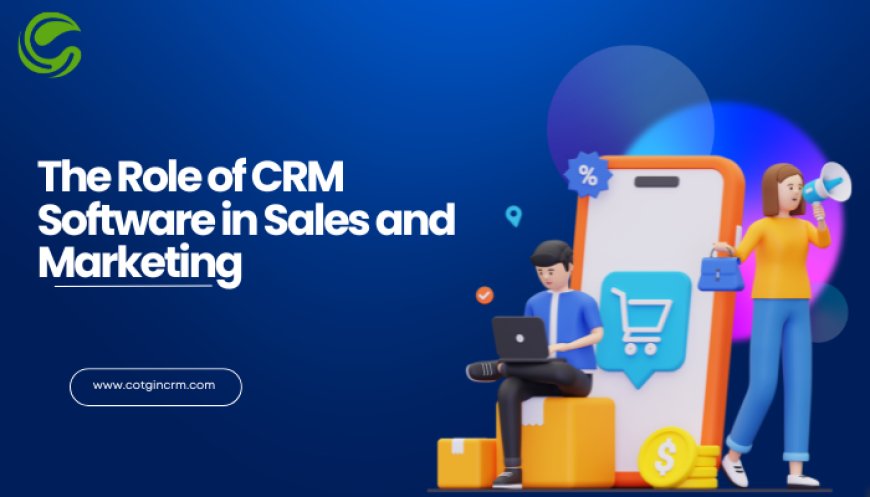The Role of CRM Software in Sales and Marketing
CRM boosts sales efficiency & marketing impact.

In today's competitive business landscape, effective customer management is crucial for driving sales and marketing success. Customer Relationship Management (CRM) software has emerged as an indispensable tool that helps businesses of all sizes manage customer interactions, streamline sales processes, and optimize marketing strategies. This article delves into the critical role of CRM software in both sales and marketing, highlighting how it can be a game-changer for businesses aiming to enhance their customer engagement and boost profitability.
Understanding CRM Software
CRM software is a centralized platform that allows businesses to manage and analyze customer data, interactions, and preferences. It stores valuable information such as contact details, purchase history, communication records, and customer feedback. With this data at their fingertips, businesses can gain deeper insights into customer behavior, enabling them to tailor their sales and marketing efforts more effectively.
Enhancing Sales Processes
One of the primary functions of CRM software in India is to streamline and improve sales processes. Here's how CRM plays a pivotal role in sales:
-
Lead Management: CRM software helps sales teams track and manage leads from the initial inquiry to the final conversion. It allows sales representatives to prioritize leads based on their potential value and stage in the sales funnel. This ensures that no lead is overlooked, and follow-ups are timely and targeted.
-
Sales Pipeline Management: CRM systems provide a visual representation of the sales pipeline, making it easy to monitor the progress of deals at various stages. This visibility helps sales managers identify bottlenecks and opportunities, allowing them to allocate resources efficiently and forecast revenue accurately.
-
Automation of Routine Tasks: CRM software automates repetitive tasks such as sending follow-up emails, scheduling meetings, and generating quotes. This frees up time for sales teams to focus on more strategic activities, such as nurturing relationships with high-value clients.
-
Improved Customer Segmentation: By analyzing customer data, CRM software enables businesses to segment their customers into distinct groups based on demographics, purchase behavior, or other criteria. This segmentation allows sales teams to personalize their approach, offering products or services that align with each customer's unique needs.
-
Enhanced Communication and Collaboration: CRM systems facilitate better communication and collaboration among sales team members. With access to real-time data, sales representatives can coordinate their efforts, share insights, and work together to close deals more efficiently.
Empowering Marketing Strategies
CRM software is equally vital for marketing teams, helping them to design and execute campaigns that resonate with their target audience. Here's how CRM software supports marketing efforts:
-
Data-Driven Marketing: CRM software provides a wealth of customer data that can be used to create highly targeted marketing campaigns. By analyzing past interactions, preferences, and purchase history, marketers can develop personalized messaging that speaks directly to the needs and desires of their audience.
-
Campaign Management and Automation: CRM systems allow marketers to plan, execute, and monitor campaigns from a single platform. Automation features enable the scheduling of emails, social media posts, and other marketing activities, ensuring consistent and timely communication with customers.
-
Lead Nurturing: CRM software enables marketers to nurture leads through personalized content and targeted offers. By tracking customer behavior and engagement, CRM systems can trigger automated responses that guide prospects through the buyer’s journey, ultimately leading to conversions.
-
Customer Journey Mapping: Understanding the customer journey is essential for effective marketing. CRM software helps marketers map out the entire customer journey, from the initial contact to the final purchase. This holistic view allows for the identification of key touchpoints and opportunities to engage customers at each stage of their journey.
-
Performance Analytics: CRM systems offer robust analytics and reporting tools that help marketers measure the effectiveness of their campaigns. By analyzing metrics such as open rates, click-through rates, and conversion rates, marketers can refine their strategies and improve ROI.
-
Customer Retention: CRM software plays a crucial role in retaining existing customers by enabling businesses to maintain strong relationships through personalized communication and loyalty programs. Retaining customers is often more cost-effective than acquiring new ones, making CRM an invaluable tool for sustaining long-term business growth.
Integration of Sales and Marketing Efforts
One of the most significant advantages of CRM software is its ability to bridge the gap between sales and marketing teams. Traditionally, these two departments have operated in silos, leading to inefficiencies and missed opportunities. However, CRM software fosters collaboration by providing a shared platform where both teams can access the same customer data and insights.
For example, marketing teams can pass on qualified leads to sales teams, ensuring that the latter focuses on prospects with the highest potential for conversion. Conversely, sales teams can provide feedback on the quality of leads and the effectiveness of marketing campaigns, allowing marketers to fine-tune their strategies.
This integration ensures that sales and marketing efforts are aligned, leading to a more cohesive customer experience and ultimately driving better business results.
Conclusion
CRM software is no longer just a tool for managing customer contacts—it has evolved into a powerful platform that drives sales and marketing success. By enhancing sales processes, empowering marketing strategies, and fostering collaboration between departments, CRM software helps businesses build stronger relationships with their customers, increase efficiency, and achieve sustainable growth.
In the dynamic and competitive business environment of India, investing in a robust CRM system is essential for staying ahead of the curve. Whether you're a small startup or a large enterprise, CRM software can provide the tools and insights you need to succeed in both sales and marketing.












